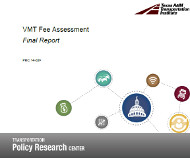6/13/2017
Texas Report Explores Per Mile TaxTexas Transportation Institute reviews options for imposing a per mile tax on Lone Star State drivers.

The transportation industry in Texas is pushing for a shift to a per-mile tax. A report by the Texas Transportation Institute (TTI) released in April explored the policy implications of various ways of implementing the new tax likely to use GPS systems that would track motorists as they drive.
Researchers reviewed pilot projects and studies in Minnesota, Oregon and Washington to identify the key issues of concern. Lawmakers in these states are anxious to see per mile taxation as a "sustainable" replacement for the gasoline tax. These politicians desire to collect additional revenue, but they consider directly raising the gas tax to be politically difficult.
"Road user charging systems have the potential to accomplish a number of transportation policy goals, but the central policy focus in efforts undertaken by the states thus far is the generation of sustainable revenue in proportion to road use," the TTI report explained.
Researchers found that the largest obstacle to public acceptance of per mile taxation is the concern over privacy. The report suggested that offering "choice" was the best solution. For instance, a low-tech odometer reading system could be an optional method of tracking mileage while also offering a GPS dongle as a high-tech option. The report noted that as technology has advanced, so too have options for the tracking systems. Still, the systems represent a massive increase in cost and complexity compared to the gas tax.
"The current fuel tax system relies on relatively few collection points, as fuel taxes are collected from fuel distributors and suppliers as opposed to individual drivers," the report explained. "Road user charges, on the other hand, would have to be collected directly from drivers or, more likely, the registered owners of vehicles. This represents a significant administrative burden for state entities, particularly in the state of Texas, which processes an average of 23 million vehicle registrations per year."
The Texas Comptroller of Public Accounts collects $2 billion a year in gasoline tax from 6366 fuel distributors (including 2171 aviation fuel dealers -- only 866 deal with gasoline only). Nearly all of the transactions are handled electronically, resulting in low overhead costs.
The Texas Department of Transportation generally deals with drivers once every two years during registration renewal, so it would not be equipped to handle monthly, weekly or daily interactions for all 23 million users based on mileage readings. The researchers suggest third parties would have to provide the tracking devices, assess road usage, collect fees and maintain user accounts.
A copy of the report is available in a 1mb PDF file at the source link below.


